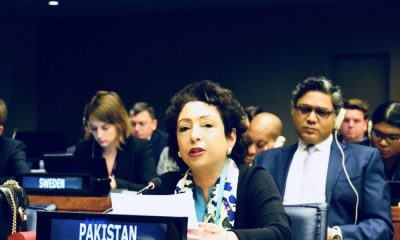World
Pakistan terms India’s UNSC bid ‘selfish,blind national ambition’

United Nations: Pakistan has taken pot shots at India’s bid for a permanent seat on the Security Council, calling it “selfish” and a claim to “self-arrogated right to a privileged and unequal status” but did not directly name it.
In a General Assembly debate on equitable representation on the Security Council, Pakistan’s Permanent Representative Maleeha Lodhi said: “Rigidity and blind pursuit of national ambition is the real reason for our persisting failure to achieve a more democratic, accountable, transparent and effective Security Council.”
Pakistan along with its ally, Italy, struck the discordant note at the debate, where there was broad support for adding permanent seats on the Security Council and several countries firmly backed India’s candidacy for one.
“A few countries have sought to promote their self-arrogated right to a privileged and unequal status,” Lodhi said. “Pakistan opposes the creation of new permanent seats as it is contrary to the universally agreed principles of our of time — accountability and transparency.”
Sounding a contradictory note, Lodhi said Pakistan “always respected African nations’ declarations calling for two permanent seats for countries from that continent even as she opposed expanding the Security Council.
“Pakistan distinguishes between the demands motivated by selfish ambitions and the collective demand of an entire continent,” she added.
Pakistan is a member of a 13-member group calling itself Uniting for Consensus, (UfC) which is led by Italy. The group steadfastly opposed the creation of a negotiating text for reform talks saying there should first be a consensus. However, without a framework document, negotiations could not take place, much less reach a consensus.
In a setback to UfC and others trying to derail efforts to add permanent members, the General Assembly last month adopted a negotiating text that would kickstart meaningful discussions on reforms.
Speaking on behalf of the UfC, Italy’s Permanent Representative Sebastiano Cardi blamed others for the stalled negotiations. “The past has demonstrated that divisive approaches and initiatives complicate our process even further, distancing us from reaching our commonly shared goal of reform.”
Reiterating the UfC’s opposition to expanding the permanent membership, he made a dig at India and other countries seeking permanent seats.
“Today we will still hear voices in favor of adding new permanent members, new veto powers, all while pursuing the same goal of making the Council more effective,” Cardi said, adding: “No one has asked them to forfeit their willingness to play a greater role in the Council.”
He said UfC was suggesting longer-term seats with the possibility of an immediate re-election. “These seats would not be reserved to a select group of countries,” he said. “All UN member states willing to make a bigger contribution to the work of the Council would have the right to run for a longer-term seat.”
World
Lockdowns in China Force Urban Communities to Defy Censorship and Vent Frustration Online

Shanghai’s rich middle class is leading a wave of online dissent over the strict and prolonged lockdowns imposed in various parts of the country. Chinese internet censorship is struggling as patience is wearing thin in many urban centers, coming up with creative forms of online protests.
Social Media Posts Revealing Lockdown Tension in Shanghai
Drawn-out lockdowns are nothing new in China as authorities insist with the nation’s zero-Covid policy since the start of the pandemic. Currently over This time around, however, metropolitan areas like Shanghai are increasingly difficult to keep quiet, given that its more than 25 million residents have seen weeks of total isolation along with food shortages and many other service interruptions.
Dozens of towns and reportedly over 300 million Chinese citizens have been affected by lockdowns of different severity. As expected, urban netizens have been most outspoken over their difficulties by finding creative ways to get around state censorship and bans placed on topics, news comments and spontaneous campaigns.
Shanghai residents have been using mobile proxies and hijacking seemingly unrelated hashtags to talk about healthcare issues, delivery failures and the overall severity of their situation. The “positive energy” that the Chinese government wants to transmit during the recent prolonged series of lockdowns does not come naturally to those counting food supplies and online censors are working hard to filter words, trending topics and undesired social media sharing.
WeChat groups and message threads are under constant monitoring. Posts questioning the zero-Covid approach have been quickly deleted, including by leading Chinese health experts like Dr. Zhong Nanshan. Video footage is soon censored and protests and investigations are quickly made to disappear.
Where this has not worked, officials have exposed banners with warnings and outright threats like “watch your own mouth or face punishment”, while drones have been patrolling the city skies. Yet, if anything, this has led to further tensions and unspoken confrontation with Shanghai’s educated and affluent middle class.
Creative Online Solutions Harnessing Civic Energy
Announcements by Chinese social media that they would be publishing the IP addresses of users who “spread rumors” have not helped either. Tech industry research has shown that much of Asia’s tech-savvy population has a habit of using mobile proxies and other privacy tools, quickly finding workarounds to browse the internet freely and talk to the world about the hottest topics.
The sheer volume of forbidden posts is already a challenge for the very censorship system, experts explain. Unable to track all trending hashtags, state workers overlook topics that speak about the US, Ukraine or other popular news. Linking human rights elsewhere to their situation, Chinese online dissidents establish their informal channels and “hijack” the conversation to share personal or publicly relevant information about the Covid suppression in their town.
Sarcastic and satirical posts still dominate. Others hope to evade the censors by replacing words from famous poems or the national anthem. One thing is certain – social media, when harnessed with the right creativity, has proven its ability to mount pressure on the government in even some of the most strictly controlled tech environments like China.























